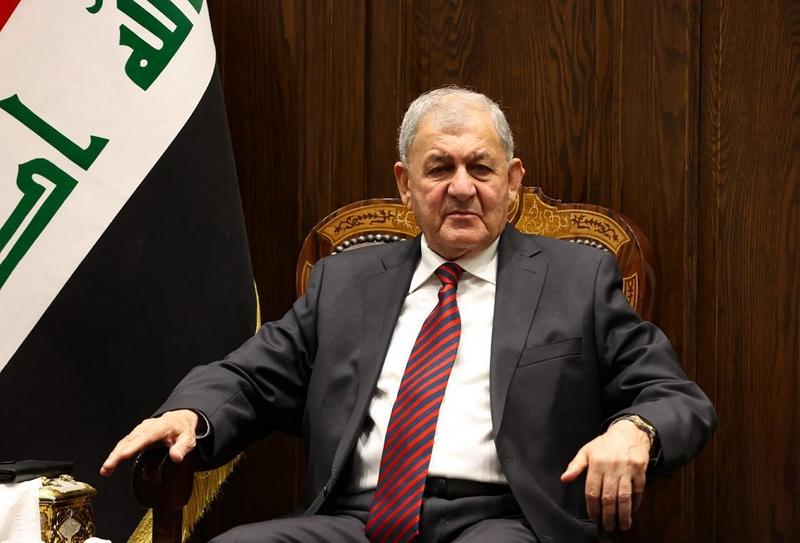 A handout picture released by the Iraqi parliament on Oct 13, 2022, shows then-presidential candidate Abdul Latif Rashid attending a parliamentary session on Oct 13, 2022. (IRAQI PARLIAMENT / AFP)
A handout picture released by the Iraqi parliament on Oct 13, 2022, shows then-presidential candidate Abdul Latif Rashid attending a parliamentary session on Oct 13, 2022. (IRAQI PARLIAMENT / AFP)
BAGHDAD - Iraqi lawmakers on Thursday elected Abdul Latif Rashid as the new president of Iraq, marking a crucial step toward forming a new government for the country and ending a year of political deadlock.
The parliament session was held shortly after unidentified militants fired nine Katyusha rockets on the heavily fortified Green Zone that houses key government buildings, including the parliament.
The parliament session was held shortly after unidentified militants fired nine Katyusha rockets on the heavily fortified Green Zone that houses key government buildings, including the parliament
The rocket barrage wounded some security members and civilians in the zone, the media office of the Iraqi Joint Operations Command said in a statement.
According to the power-sharing system in Iraq after 2003, the presidency should be reserved for the Kurds, the parliament speaker's post for the Sunnis, and the prime minister's for the Shi'ites.
In Thursday's session, Rashid received 162 votes in the second round of voting, defeating Barham Salih, who gained 99 votes, while eight votes were considered invalid, according to the media office of the parliament.
ALSO READ: Iraq sees case surge in possible 5th COVID-19 wave
The newly-elected Rashid was later sworn in as the President of Iraq, the fifth president of the country since 2003.
Abdul Latif Rashid, 78, is a veteran Kurdish politician born in the city of Sulaimaniyah in northeastern Iraq. He worked as Minister for Water Resources from September 2003 to December 2010.
He is an active member of the Patriotic Union of Kurdistan (PUK) under the leadership of Jalal Talabani, who became president of Iraq in 2005.
Rashid was formerly a spokesperson for the PUK in Britain, where he received a bachelor's degree in civil engineering in 1968 from Liverpool University, a master's degree in 1972, and a doctorate in Engineering from Manchester University in 1976.
After the parliament session, Rashid tasked Mohammed Shia' al-Sudani with forming a new government as al-Sudani was nominated by the Coordination Framework (CF), the largest parliamentary alliance and an umbrella group of Shi'ite parliamentary parties.
Al-Sudani, now as the prime minister-designate, will have 30 days to form the new government, according to the constitution.
READ MORE: 12 ballistic missiles hit Iraq's Kurdish regional capital
Al-Sudani previously served as minister of human rights from 2010 to 2014 and minister of labor and social affairs from 2014 to 2018.
Iraqi caretaker Prime Minister Mustafa al-Kadhimi congratulated al-Sudani, and wished him success in the task of forming the government.
Rashid's election as president came as political tensions have been rising in the past months between the Shi'ite cleric Moqtada al-Sadr's Sadrist Movement, the biggest winner in the parliamentary elections in 2021, and its rivals in the CF alliance.
Al-Sadr demanded to dissolve parliament and hold early elections, but it was rejected by the CF parties, which became the largest bloc after al-Sadr ordered his followers to withdraw from the parliament in June.


